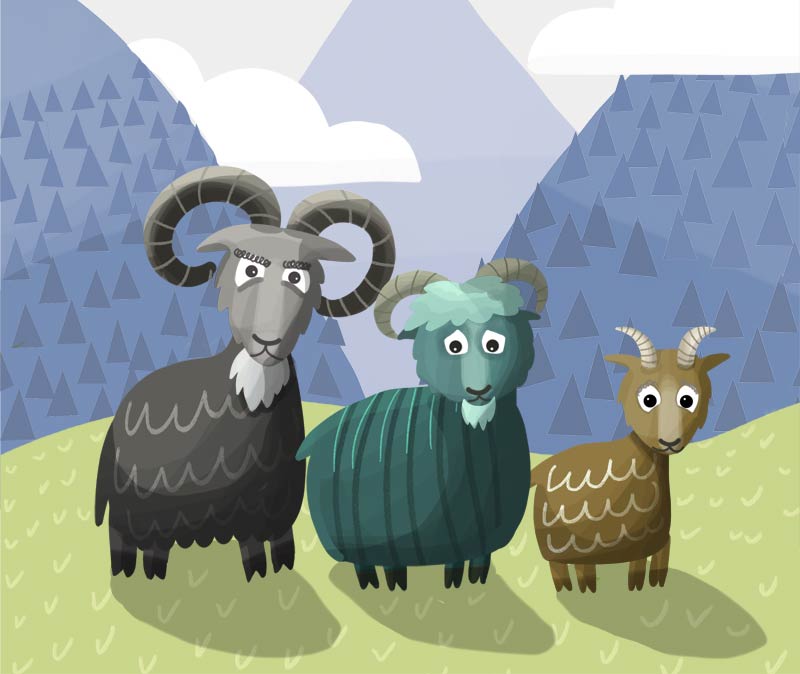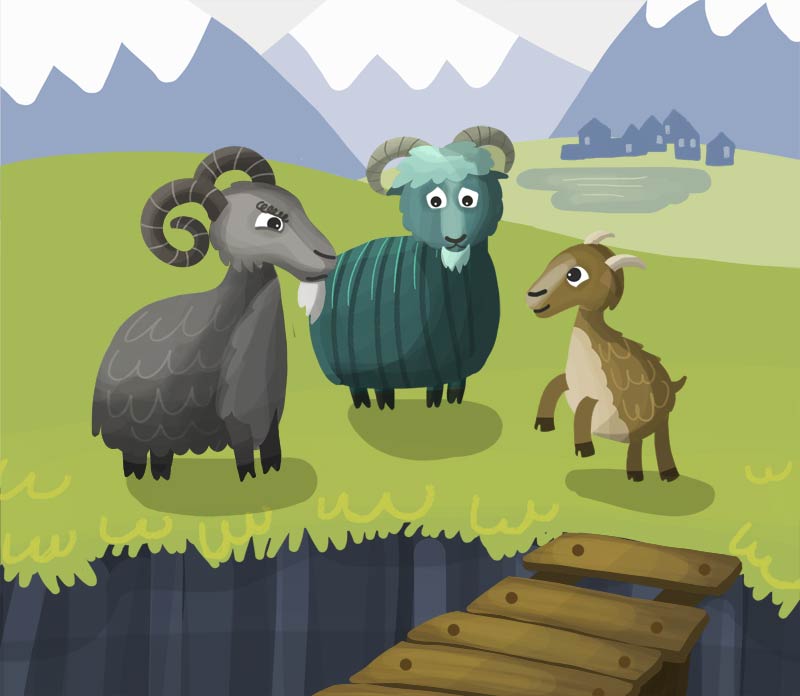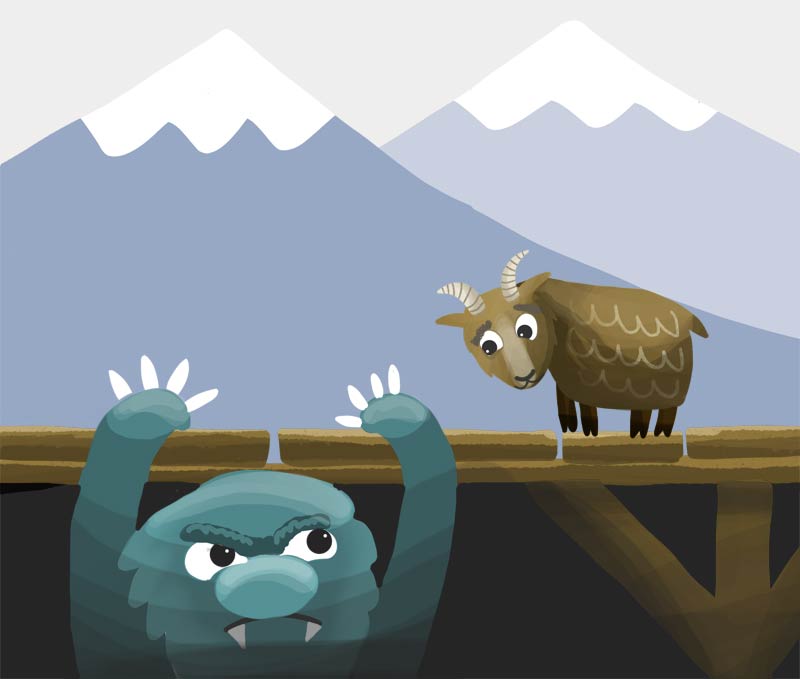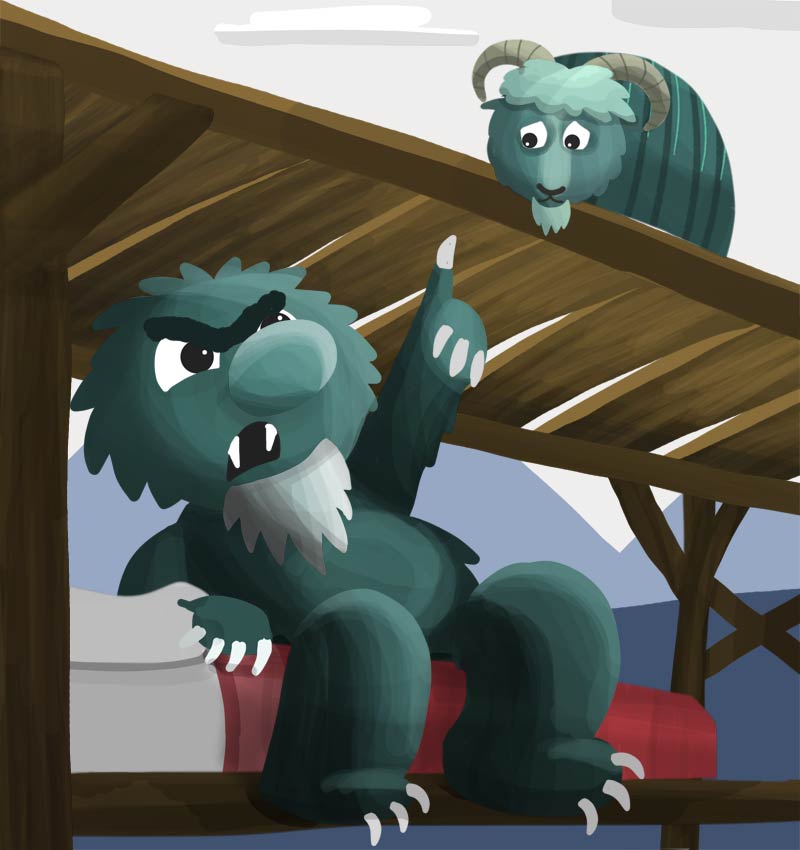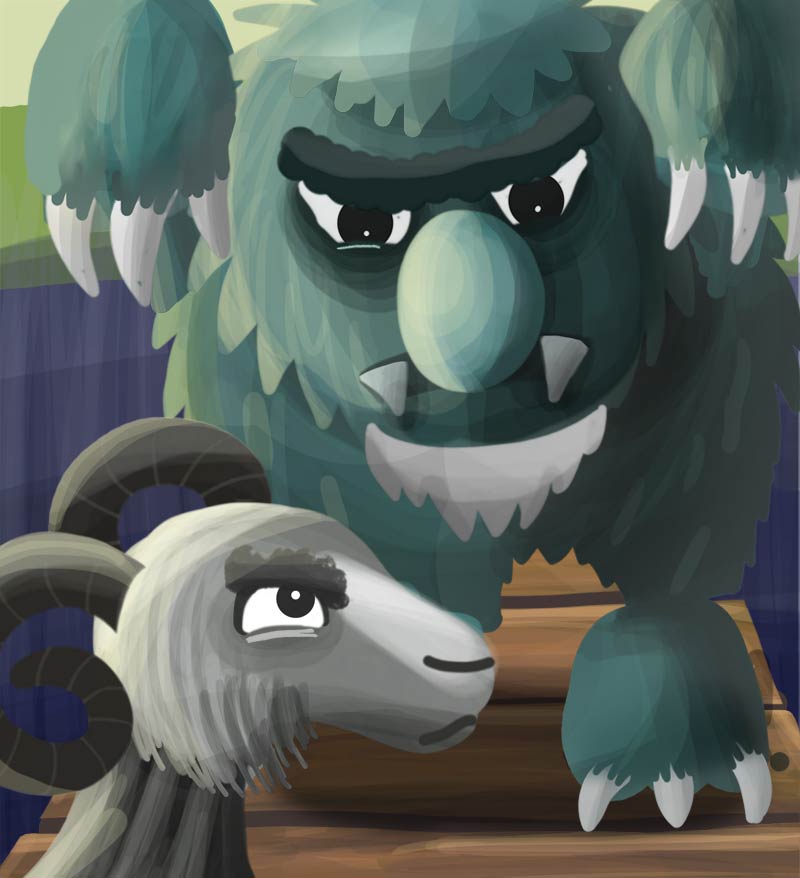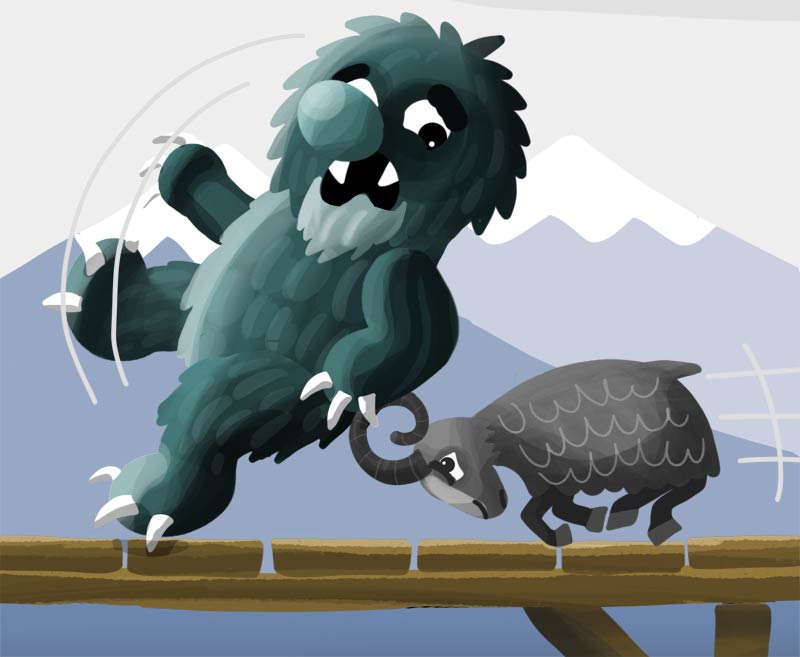Laissez-moi vous raconter l’histoire des trois boucs. Ils vivent dans les montagnes, dans un petit village de chèvres appelé Chèvreville.
Let me tell you the story of the three goats. They live in the mountains, in a small village of goats called Chèvreville (literally: Goattown).
Les trois boucs sont frères mais ils sont très différents. Le plus jeune des frères est le plus petit, le second né est le plus gros et le plus vieux est le plus fort.
The three goats are brothers but they are very different. The youngest of the brothers is the smallest, the second born is the biggest and the oldest is the strongest.
Comme vous le savez probablement, les chèvres mangent de l’herbe tout le temps. De l’herbe au petit-déjeuner… De l’herbe au déjeuner… De l’herbe au dîner. (Parfois elles prennent du gâteau au chocolat pour le dessert, mais d’habitude elles mangent juste encore plus d’herbe).
As you probably know, goats eat grass all the time. Grass for breakfast… Grass for lunch… Grass for dinner. (Sometimes they have chocolate cake for dessert, but usually they just eat more grass).
En été, il y a beaucoup d’herbe haute et verte à Chèvreville. Mais, l’hiver venu, les montagnes sont couvertes d’une épaisse couche de neige. Il n’y a plus d’herbe nulle part.
In summer, there is a lot of tall, green grass in Chèvreville. But when winter comes, the mountains are covered with a thick layer of snow. There is no more grass anywhere.
Cet hiver-là, devant ce problème, les trois boucs décident de descendre de la montagne pour trouver de l’herbe haute et verte dans le pré de l’autre côté de la ville.
That winter, faced with this problem, the three goats decide to come down from the mountain to find tall, green grass in the meadow on the other side of town.
Ils traversent la route (cataclop, cataclop),
... le village (cataclop, cataclop),
... l’étang (splish-splash, splish-splash),
... jusqu’à ce qu’ils arrivent devant un grand pont.
They cross the road (clip-clop, clip-clop),
... the village (clip-clop, clip-clop),
... the pond (splish-splash, splish-splash),
...until they come to a big bridge.*
Arrivent is the present subjunctive of arriver. We need to use it because we’ve said “jusqu’à ce que” (which means “until”), and this phrase needs us to use the subjunctive.
De l’autre côté du pont pousse l’herbe la plus haute et la plus verte que les boucs aient jamais vue. Ils tapent des pieds et remuent leurs queues. Miam, miam ! De l’herbe !
On the other side of the bridge grows the tallest and greenest grass the goats have ever seen. They stamp their feet and wag their tails. Yum, yum! Grass !
Aient = avoir (to have) in the present subjunctive (3rd person plural). We are using this because whether or not this is, in fact, the tallest, greenest grass the goats have ever seen is a judgement, rather than a hard fact.
Mais le pont est très long et très étroit. Un seul bouc peut traverser à la fois.
« Hé les gars, laissez-moi y aller en premier, dit le plus jeune bouc. Je suis le plus petit et le plus rapide. Je vais voir si le pont est sûr ! »
But the bridge is very long and very narrow. Only one goat can cross at a time.
“Hey guys, let me go first,” said the younger goat. “I am the smallest and the fastest. I'll see if the bridge is safe!”
« Si c’est ce que tu veux », disent les autres boucs, et le plus jeune des frères commence à traverser le pont.
"If that's what you want," say the other goats, and the youngest brother begins to cross the bridge.
Lorsqu’il arrive au milieu du pont, il entend une grosse voix terrifiante venant d’en-dessous...
« Qui est là-haut ? Qui cataclope sur mon pont ? »
When he reaches the middle of the bridge, he hears a big terrifying voice coming from below...
“Who's up there? Who is clip-clopping on my bridge?”
Le jeune bouc réfléchit un moment et répond :
« Bonjour ! Je m’appelle Lucien. J’aime tricoter et jouer aux cartes. Ma couleur préférée est le rouge et mes plats préférés sont l’herbe et le gâteau au chocolat. Comment allez-vous ?
The young goat thinks for a moment and replies:
"Hello! My name is Lucian. I like to knit and play cards. My favorite color is red and my favorite foods are grass and chocolate cake. How are you?"
— Je me fiche de qui tu es ! crie le troll. Tu m'as réveillé ! Maintenant j'ai faim et je vais te manger pour le petit-déjeuner !
“I don't care who you are!” shouts the troll. “You woke me up! Now I'm hungry and I'm going to eat you for breakfast!"
— Argh, pense Lucien le bouc. Quel troll grossier et grincheux ! »
Mais Lucien est très intelligent alors il dit au troll :
“Argh,” thinks Lucien the Goat. “What a rude and grumpy troll!”
But Lucien is very clever, so he says to the troll:
« Excusez-moi, Monsieur le Troll. Je suis petit et n’ai que la peau sur les os, et j’ai un goût de chou. Mais mon frère est plus grand et a meilleur goût que moi. Attendez-le ! Il est juste derrière moi.
“Excuse me, Mr. Troll. I'm small and just skin and bones, and I taste like cabbage. But my brother is bigger and tastes better (lit: has a better taste) than me. Wait for him! He is right behind me.”
— Berk ! Je déteste le chou ! ronchonne le troll. D'accord, je vais attendre. Ravi de te rencontrer Lucien, bonne journée. »
Là-dessus, Lucien court sur le pont (cataclop, cataclop) jusqu’à atteindre l’herbe haute et verte du pré.
- Yuck! I hate cabbage! grumbles the troll. Alright, I'll wait. Nice to meet you Lucien, have a lovely day."
With that*, Lucien runs across the bridge (clip-clop, clip-clop) until he reaches the tall, green grass of the meadow.
Là-dessus is a phrasal expression, literally meaning “upon that” or “thereupon”. It is used a lot in everyday (metropolitan) French when retelling a story in the present tense, like we’re doing here!
Ses frères le voient batifoler dans l’herbe. Ils en ont l’eau à la bouche. Ils en remuent les oreilles d’excitation.
« Hé mon pote, laisse-moi être le suivant ! dit le second-né des boucs. Je suis plus gros que toi. Si je peux traverser ce pont, alors il est sans danger pour toi !
His brothers see him frolicking in the grass. Their mouths are watering. (Literally: They have water in their mouths.) They wiggle their ears with excitement.
“Hey buddy, let me be next!" said the second-born of the goats. “I am fatter than you. If I can cross this bridge, then it's safe for you!”
« Si c’est ce que tu veux », dit le bouc aîné. Le second né se met alors en marche.
Lorsqu’il arrive au milieu du pont, il entend une grosse voix terrifiante venant d’en-dessous…
“If that's what you want,” says the elder goat. The second born then sets off.
When he reaches the middle of the bridge, he hears a loud, terrifying voice coming from below...
« Qui est là-haut ? Qui cataclope sur mon pont ? »
Le second né des bouc réfléchit un moment et répond :
“Who's up there? Who is clip-clopping on my bridge?”
The second-born goat thinks for a moment and replies:
« Bonjour, Monsieur le Troll ! Je m’appelle Roger. J’aime jouer du piano et chanter de l’opéra. Ma couleur préférée est le jaune et mes plats préférés sont l’herbe et le gâteau au chocolat. Comment allez-vous ?
“Hello, Mr. Troll! My name is Roger. I like to play the piano and sing opera. My favorite color is yellow and my favorite foods are grass and chocolate cake. How are you?”
— Je me fiche de qui tu es ! crie le troll. Tu m'as réveillé ! Maintenant j'ai faim et je vais te manger pour le petit-déjeuner !
“I don't care who you are!” shouts the troll. “You woke me up! Now I'm hungry and I'm going to eat you for breakfast!"
— Mon Dieu, pense le bouc. Quel troll grossier et grincheux ! »
Mais Roger le bouc n’est pas bête, alors il dit au troll :
“My goodness,” thinks the goat. “What a rude and grumpy troll!”
But Roger the goat is not silly, so he says to the troll:
« Excusez-moi, Monsieur le Troll. Je sais que j’ai l’air gras et savoureux, mais ce n’est en réalité que du gaz. Si vous me mangez, j’aurai un goût de pet. Mais mon frère a bien meilleur goût que moi. Attendez-le ! Il est juste derrière moi !
“Excuse me, Mr. Troll. I know I look fat and tasty, but it's really just gas. If you eat me, I will taste like a fart. But my brother is much tastier (lit: has a much better taste) than me. Wait for him! He's right behind me!”
— Dégoûtant ! Je hais les pets ! ronchonne le troll. D'accord, je vais attendre. Ravi de te rencontrer Roger, bonne journée. »
Là-dessus, Roger court sur le pont (cataclop, cataclop) jusqu’à atteindre l’herbe haute et verte du pré.
“Disgusting ! I hate farts!” grumbles the troll. “Alright, I'll wait. Nice to meet you Roger, have a lovely day.”
With that, Roger runs across the bridge (clip-clop, clip-clop) until he reaches the tall, green grass of the meadow.
Le bouc aîné voit Lucien et Roger jouer dans l’herbe. Il fait une petite danse de bouc et laisse échapper un bêlement rigolo. Mê-eee ! Mê-eee !
« Maintenant c’est à mon tour ! » dit l’aîné bouc et il se met à traverser le pont.
The eldest goat sees Lucien and Roger playing in the grass. He does a little goat dance and lets out a funny bleat. Me-eee! Me-eee!
“Now it’s my turn!” says the eldest goat and he starts to cross the bridge.
Lorsqu’il arrive au milieu du pont, il entend une grosse voix terrifiante venant d’en-dessous…
« Qui est là-haut ? qui cataclope sur mon pont ? »
Le grand bouc réfléchit un moment et répond :
When he reaches the middle of the bridge, he hears a loud, terrifying voice coming from below...
"Who's up there? Who is clip-clopping on my bridge?"
The big goat thinks for a moment and replies:
« Bonjour! Je m’appelle Hervé. J’aime faire des petits gâteaux et me promener sur la plage. Ma couleur préférée est le bleu et mes plats préférés sont l’herbe et le gâteau au chocolat. Comment allez-vous ?
“Hello! My name is Herve. I like to bake cupcakes and walk on the beach. My favorite color is blue and my favorite foods are grass and chocolate cake. How are you?”
— Je me fiche de qui tu es ! crie le troll. Tu m'as réveillé ! Maintenant j'ai faim et je vais te manger pour le petit-déjeuner !
— Oh-oh, pense Herve. Quel troll grossier et grincheux ! »
“I don't care who you are!” shouts the troll. “You woke me up! Now I'm hungry and I'm going to eat you for breakfast!"
“Uh oh,” thinks Herve. “What a rude and grumpy troll!”
Mais avant qu’Hervé ne puisse ajouter quoi que ce soit, le troll saute sur le pont. Il a des mains aussi grosses que des assiettes. Ses pieds sont aussi longs que des baguettes. Et les poils sur son dos sont aussi épais que de l’herbe.
But before Herb can say anything else (literally: add anything), the troll jumps onto the bridge. He has hands as big as plates. His feet are as long as loaves of bread. And the hair on his back is as thick as grass.
ne puisse : A couple of tricky things here: This is the subjunctive present form of “pouvoir” (to be able to). It’s here because we’ve said “avant que” ('before'). Certain conjunctions like “avant que” need us to use the subjunctive. The “ne” is not negating “puisse”, like you’d expect. It’s called the “ne explétif”, and it is also required here because we’ve used “avant que”. This is intermediate-level stuff, so you can either ignore it for now, or learn more about it here and here.
Le troll s’étire et secoue son corps poilu avant de grogner :
« Deux boucs ont déjà traversé le pont aujourd'hui, alors ne va pas me dire que tu as un frère plus grand ou plus savoureux. Je ne suis pas une truffe ! Maintenant, ne bouge pas, que je puisse te manger ! J'ai très faim ! »
The troll stretches and shakes his hairy body before growling:
"Two goats have already crossed the bridge today, so don't tell me you have a bigger or tastier brother. I am not a nitwit! (literally: truffle) Now don't move, so I can eat you! I'm very hungry ! »
Hervé le bouc est très intelligent, mais souvenez-vous ... Il est aussi le plus fort des trois boucs.
Hervé the goat is very intelligent, but remember... He is also the strongest of the three goats.
Il tape donc du pied. Il baisse ses cornes. Puis il charge le troll ... Cataclop, cataclop, cataclop ... BAM ! Il cogne le troll dans le derrière et le fait tomber du pont.
So he stamps his foot. (lit: He stamps therefore his foot.) He lowers his horns. Then he charges the troll... Clip-clop, clip-clop, clip-clop ...BAM! He butts the troll in the behind and knocks him (lit: makes him fall) off the bridge.
« AAAAAHHHH ! » couine le troll en tombant tout en bas dans la rivière.
Splash !
“AAAAAHHHH!” squeals the troll as he falls all the way down into the river.
Splash!
Hervé court sans encombre jusque de l’autre côté du pont et rejoint ses frères. Les trois boucs mangent un grand déjeuner composé d’herbe haute et verte. Ils discutent et rient et jouent au chèvrefoot – loin de la froide neige de l’hiver.
Hervé runs safely (lit: unencumbered / without issue) to the other side of the bridge and joins his brothers. The three goats eat a big lunch (composed) of tall, green grass. They chat and laugh and play goat football* – far from the cold winter snow.
Chèvrefoot = Not a real sport, sadly.
Et le troll ? Il a été emporté par la rivière, jusqu’à la mer. Et on ne l’a plus jamais revu.
And the troll? He was carried down the river to the sea. And we never saw him again.

Download this audio
Need help? How to download audio to your device


